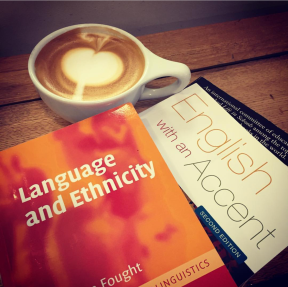Teaching Philosophy

As a researcher and teacher educator, I orient my work around critical literacies, culturally (and linguistically) sustaining pedagogies, and anti-racist curriculum. I aim to facilitate experiences that enable current and future teachers and researchers to disrupt deficit narratives and damage-centered research. In my courses, I prioritize frameworks that uplift the complex range of language and literacy practices of our students. As teachers, I believe we must approach our work with an understanding of power, privilege, and oppression, and how education can reinforce or disrupt these dynamics.
Current Courses

EDIS 7840: Discourse Analysis in Education, Doctoral Seminar
University of Virginia, School of Education and Human Development
This course provides an introduction to discourse analysis theory and methodology as they relate to classrooms and other educational settings. Readings provide an overview of discourse analysis approaches used in educational research, with a particular focus on micro-ethnographic and conversation-analytic approaches. Fieldwork and hands-on analysis of discourse form a significant portion of the course.
EDIS 5428: ESL Methods PreK-12
University of Virginia, School of Education and Human Development
This course is designed for current and future teachers seeking an ESL endorsement with their Virginia teaching license or seeking to learn more about how to serve English learners (ELs) in classrooms.
EDIS 5470: ESOL Assessment & Curriculum Design
University of Virginia, School of Education and Human Development
The purpose of this course is to prepare teachers to work with students (K-12) for whom English is not their first language. Work includes examining instruments used to assess English proficiency and the interpretation of those assessments. The curriculum design aspect of the course is based on a differentiation model. Discussions will include topics such as cultural differences in personal interactions, strategies for working with families, and effective strategies for facilitating the learning of English by speakers of other languages and dialects.
EDIS 5423: English Linguistics
University of Virginia, School of Education and Human Development
This course introduces the scientific study of language, exploring how linguistic insights can prepare teachers who work with preK-12 ELLs. It addresses the sounds of the language (phonetics and phonology), the structure of words/sentences (morphology and syntax) and how these features convey meaning (semantics and pragmatics). Students apply this knowledge of language to the everyday use of English and its acquisition in school settings.
Courses Previously Taught

TL525: Teaching English Language Learners in Middle/High School
Boston University, School of Education
Focus on current theory/research related to teaching English language learners and the implications for effective language, literacy, and content-area assessment and instructional practices in Sheltered English Immersion classrooms in middle/high schools. Planned for students seeking licensure in the content areas at the 5-12 level.
TL525: Teaching English Language Learners in Elementary School
Boston University, School of Education
Focus on current theory/research related to teaching English language learners and the implications for effective language, literacy, and content-area assessment and instructional practices in Sheltered English Immersion classrooms in middle/high schools. Planned for students seeking licensure in the content areas at the K-4 level.
BI620: Educational Issues in Bilingualism
Boston University, School of Education
Explores the effect of language diversity on the education of school-aged students. Examines national and international theory, research, policy, and practice in teaching students who speak languages other than the national language
EDUC7473: Teaching Writing
Boston College, School of Education and Human Development
Discusses developing and sustaining a writing curriculum for teachers in K-12, including a variety of pedagogical approaches to developing a sustained and enjoyable classroom writing culture. Grade is based on a portfolio of finished writing and a strategic plan for implementing writing protocols and ideas in the classroom.
EDUC7436: Curriculum Theories and Practice
Boston College, School of Education and Human Development
Asks teachers to analyze the philosophical underpinnings of educational practices. Also asks teachers to examine their own philosophies of education and to construct meaning and practice from the interplay between their beliefs and alternative theories. Designed for individuals advanced in their professional development.
HDF702: Language, Literacy, and Culture
Wheelock College, School of Education
Explores the relationships between language and culture. Examines methods of helping linguistically diverse students develop literacy abilities within contexts that draw upon and extend home language competencies. Focuses both on native English speakers who speak non-mainstream varieties of English and on children who speak a first language other than English.
RES722: Research on Language and Literacy
Wheelock College, School of Education
Introduces varied approaches to language and literacy research. Provides experience with qualitative and quantitative data collection and analysis. Participants prepare analyses of assessment data and write research briefs for other teachers. Based on questions from their practice, students summarize existing literature and prepare a research proposal.